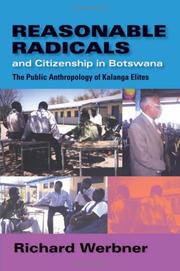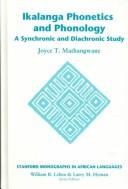| Listing 1 - 4 of 4 |
Sort by
|
Book
ISBN: 9781407310190 1407310194 Year: 2012 Volume: 2420 82 Publisher: Oxford Archaeopress
Abstract | Keywords | Export | Availability | Bookmark
 Loading...
Loading...Choose an application
- Reference Manager
- EndNote
- RefWorks (Direct export to RefWorks)
Kalanga (African people) --- Excavations (Archaeology) --- Social archaeology --- Kalanga (Peuple d'Afrique) --- Fouilles (Archéologie) --- Archéologie sociale --- History --- Histoire --- Zimbabwe --- Botswana --- Antiquities. --- Antiquities --- Antiquités --- State collapse. --- Iron age --- Social archaeology. --- History. --- Africa, Southern --- Fouilles (Archéologie) --- Archéologie sociale --- Antiquités

ISBN: 1282072234 0253110246 9780253110244 0253344026 9780253344021 025321677X 9780253216779 9781282072237 Year: 2004 Publisher: Bloomington, Ind. Indiana University Press
Abstract | Keywords | Export | Availability | Bookmark
 Loading...
Loading...Choose an application
- Reference Manager
- EndNote
- RefWorks (Direct export to RefWorks)
Are self-interested elites the curse of liberal democracy in Africa? Is there hope against the politics of the belly, kleptocracies, vampire states, failed states, and Afro-pessimism? In Reasonable Radicals and Citizenship in Botswana, Richard Werbner examines a rare breed of powerful political elites who are not tyrants, torturers, or thieves. Werbner's focus is on the Kalanga, a minority ethnic group that has served Botswana in business and government since independence. Kalanga elites have expanded
Kalanga (African people) - Botswana - Politics and government. --- Kalanga (African people) --- Elite (Social sciences) --- Regions & Countries - Africa --- History & Archaeology --- Elites (Social sciences) --- Leadership --- Power (Social sciences) --- Social classes --- Social groups --- Western Shona (African people) --- Ethnology --- Shona (African people) --- Politics and government --- Government --- Botswana --- Kalanga (African people) - Botswana - Politics and government --- Politics and government.

ISBN: 1575861631 Year: 1999 Publisher: Stanford (Calif.) : CSLI,
Abstract | Keywords | Export | Availability | Bookmark
 Loading...
Loading...Choose an application
- Reference Manager
- EndNote
- RefWorks (Direct export to RefWorks)
Kalanga language (Botswana and Zimbabwe) --- Bakaa language --- Chikalanga language --- Ikalanga language --- Kalaga language --- Kalana language --- Makalaka language --- Makalanga language --- Sekalana language --- Sekanana language --- Shona language, Western --- Wakalanga language --- Western Shona language --- Bantu languages --- Phonetics. --- Phonology. --- Theses --- Phonetics --- Phonology
Book
ISBN: 1283665905 1580467857 1580464181 Year: 2012 Publisher: Rochester, NY : University of Rochester Press,
Abstract | Keywords | Export | Availability | Bookmark
 Loading...
Loading...Choose an application
- Reference Manager
- EndNote
- RefWorks (Direct export to RefWorks)
Ethnicity in Zimbabwe: Transformations in Kalanga and Ndebele Societies, 1860-1990' is a comparative study of identity shifts in two large ethnic groups in Matabeleland, Zimbabwe. The study begins in 1860, a year after the establishment of the Inyati mission station in the Ndebele Kingdom, and ends in the postcolonial period. Author Enocent Msindo asserts that-despite what many social historians have argued-the creation of ethnic identity in Matabeleland was not solely the result of colonial rule and the new colonial African elites, but that African ethnic consciousness existed prior to this time, formed and shaped by ordinary members of these ethnic groups. During this period, the interaction of the Kalanga and Ndebele fed the development of complex ethnic, regional, cultural, and subnationalist identities. By examining the complexities of identities in this region, Msindo uncovers hidden, alternative, and unofficial histories; contested claims to land and civic authority; the politics of language; the struggles of communities defined as underdogs; and the different ways by which the dominant Ndebele have dealt with their regional others, the Kalanga. The book ultimately demonstrates the ways in which debates around ethnicity and other identities in Zimbabwe-and in Matabeleland in particular-relate to wider issues in both rural and urban Zimbabwe past and present. Enocent Msindo is Senior Lecturer in History at Rhodes University, Grahamstown, South Africa.
Ndebele (African people) --- Kalanga (African people) --- Ethnic relations. --- HISTORY --- SOCIAL SCIENCE --- Behavioral sciences --- Human sciences --- Sciences, Social --- Social science --- Social studies --- Civilization --- Annals --- Auxiliary sciences of history --- Inter-ethnic relations --- Interethnic relations --- Relations among ethnic groups --- Acculturation --- Assimilation (Sociology) --- Ethnic groups --- Ethnology --- Social problems --- Sociology --- Minorities --- Race relations --- Western Shona (African people) --- Shona (African people) --- Amandebele (African people) --- Matabele --- Matabele (African people) --- Rhodesian Ndebele (African people) --- Tabele (African people) --- Tebele (African people) --- Nguni (African people) --- Zulu (African people) --- South --- General. --- Minority Studies. --- Ethnic Studies --- Discrimination & Race Relations. --- Anthropology --- Cultural. --- Ethnic identity. --- History. --- Zimbabwe --- Matabeleland (Zimbabwe) --- An tSiombáib --- Cimbabue --- Dēmokratia tēs Zimpampoue --- Government of Zimbabwe --- GOZ (Zimbabwe) --- Jinbabue --- Poblachd Shiombabue --- Repubblica dello Zimbabwe --- Republic of Zimbabwe --- República de Zimbabue --- Republika Zimbabve --- Simbabve --- Simbabwe --- Siombabue --- Yn Çhimbabwe --- Zimbabhue --- Zimbabua --- Zimbabue --- Zimbabvah --- Zimbabve --- Zimbabṿeh --- Zimbabves Republika --- Zīmbābvih --- Zimbabvo --- Zimbabweh --- Zimpampoue --- Ζιμπάμπουε --- Δημοκρατία της Ζιμπάμπουε --- Република Зимбабве --- Зимбабуе --- Зимбабве --- Зімбабве --- זימבבואה --- זימבבווה --- زيمبابوه --- ジンバブエ --- Southern Rhodesia --- African Ethnic Consciousness. --- Colonial Rule. --- Cultural Identities. --- Dominant Ndebele. --- Ethnicity Debates. --- Ethnicity. --- Identity Shifts. --- Kalanga. --- Land Claims. --- Language Politics. --- Matabeleland. --- Ndebele. --- Regional Identities. --- Rural Zimbabwe. --- Subnationalist Identities. --- Urban Zimbabwe. --- Zimbabwe History. --- Zimbabwe.
| Listing 1 - 4 of 4 |
Sort by
|

 Search
Search Feedback
Feedback About UniCat
About UniCat  Help
Help News
News